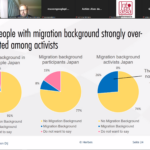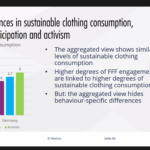
Download
Registration Info
This is a past event. Registration is no longer possible.
Please subscribe below to stay informed about our research activities, events, and publications:
Generation Z and sustainable consumption – results from interviews and a comparative online survey in Japan and Germany
November 24, 2022
Carsten Herbes, Nuertingen-Geislingen University, Germany/DIJ Tokyo
Private consumption accounts for a significant share of the environmental and social impact of human activities, such as the depletion of natural resources or greenhouse gas emissions. Ensuring sustainable consumption and production patterns is one of the UN sustainable development goals (SDG 12). Therefore, understanding consumer perceptions and behaviours is important for policy makers and companies but also for NGOs. A comparative perspective including different industrialized countries can provide particularly interesting insights, however, comprehensive comparative studies of young consumers are scarce. Building on various theories frequently used in consumer research, such as the Theory of Planned Behaviour, we conducted consumer interviews with GenZ members (age 16-24) in Japan and Germany as well as expert interviews. Subsequently, we performed a representative online survey of around 500 GenZ consumers in each of the two countries. In his presentation, Carsten Herbes shed light on the similarities and differences in consumption behaviour between Japanese and German youth, focusing on the areas of food and clothing, where young people typically enjoy a high consumption autonomy. Moreover, he looked into influencing factors such as attitudes, norms, perceived opportunities, knowledge and trust, but also at engagement in the Fridays for Future movement.
This session brought together scholars from various fields of research, including social science, management, economics, and political science. Following Professor Herbes’ presentation, the participants discussed the methodology, statistics and data, and implications for the overall aspect of sustainability.
Carsten Herbes is full professor at Nuertingen-Geislingen University (NGU) and heads the Institute for International Research on Sustainable Management and Renewable Energy (ISR). His research focuses on decision processes of consumers and companies on sustainable products and services. Besides general inquiries in this field, he focuses on renewable energy, packaging and gardening products. He has led numerous research projects funded by the German Ministries of Research, of Economics and of Agriculture. Carsten Herbes is a frequent speaker at international conferences and publishes his results, amongst others, in the Journal of Cleaner Production, International Journal of Consumer Studies, Resources, Conservation & Recycling, Energy Research, and Social Science and Energy Policy. He is currently Scholar in Residence at the DIJ.

